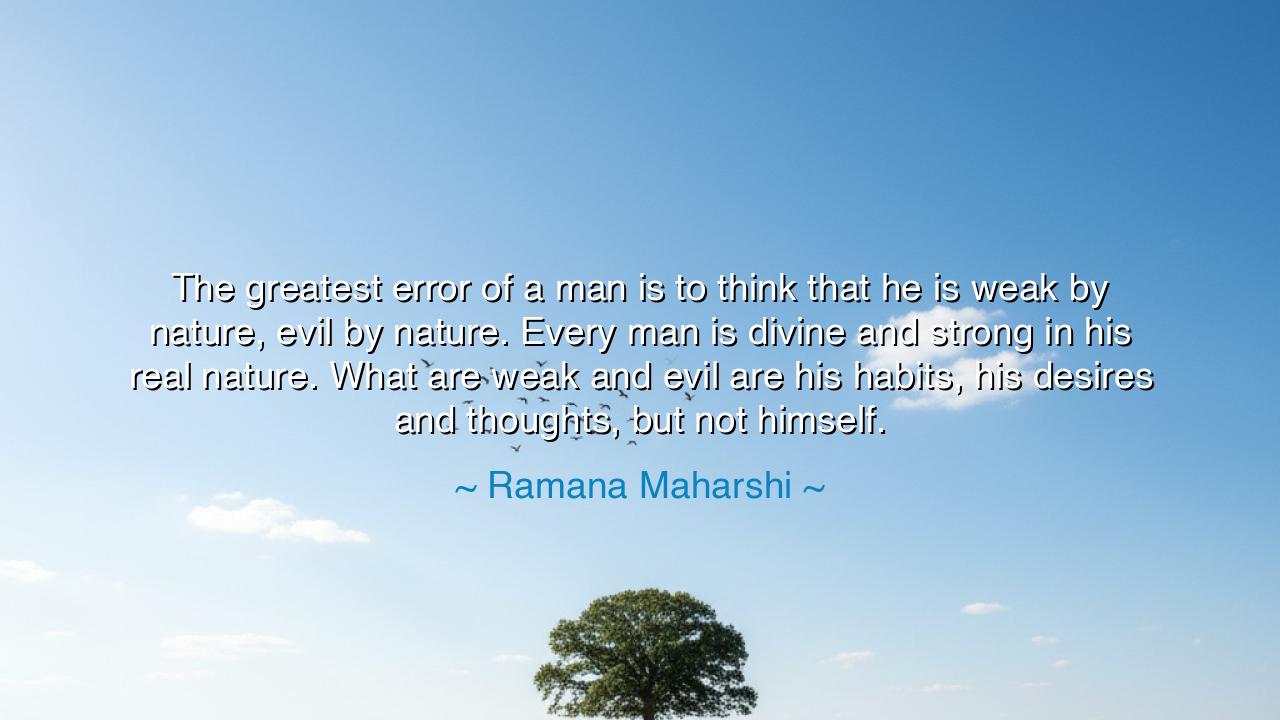
The greatest error of a man is to think that he is weak by
The greatest error of a man is to think that he is weak by nature, evil by nature. Every man is divine and strong in his real nature. What are weak and evil are his habits, his desires and thoughts, but not himself.






The words of Ramana Maharshi—“The greatest error of a man is to think that he is weak by nature, evil by nature. Every man is divine and strong in his real nature. What are weak and evil are his habits, his desires and thoughts, but not himself”—resound as a mighty call to awaken the slumbering soul. They declare that the true essence of man is not corruption but divinity, not frailty but strength. The error lies not in our being but in our believing, for when one convinces himself he is nothing, he becomes nothing. But when he remembers that his core is eternal, radiant, and powerful, then he rises beyond the shadows of despair and walks as a child of the divine.
The origin of this wisdom flows from the ancient streams of Vedantic thought, where the self—Atman—is seen as a spark of the eternal Brahman, untouched by stain or weakness. Ramana, who lived much of his life in deep meditation upon the Self, proclaimed that our struggles are not with who we truly are, but with the illusions we weave through habits, cravings, and restless thoughts. Evil is not the root of our being, but a cloud that veils the light. Weakness is not our nature, but a mask worn too long. Remove the mask, and the glory of the soul shines forth.
History bears witness to this truth in the lives of the great. Consider Mahatma Gandhi, frail in body yet unshakable in spirit. Many thought him weak, unsuited to lead against an empire. Yet his strength did not spring from physical force or violent conquest, but from the unbreakable conviction that within himself—and within every human being—lived a dignity that oppression could not erase. His habits of nonviolence and truth replaced the habits of fear and subjugation, and through this inner strength, he shook the foundations of the world. Gandhi’s life is proof that the divine nature Ramana spoke of is not poetry, but living power.
The emotional force of Ramana’s words lies in their ability to free the soul from despair. How many live in self-condemnation, believing they are broken, wicked, unworthy of love or greatness? To such hearts, this teaching comes as a healing balm: you are not the sum of your failures. Your true nature is not chained to weakness, nor defined by passing desires. You are as the sun, obscured at times by clouds, yet never diminished in brilliance. The task is not to create divinity, but to uncover it—to peel away the habits and thoughts that conceal what was always there.
Yet this wisdom also demands responsibility. If weakness and evil are not our essence but our habits, then they can be unlearned, transformed, cast aside. This means that no man may excuse himself by saying, “I was born corrupt, I was born weak.” Such words are lies to the soul. What enslaves us are patterns we have allowed to grow strong. But what habits have been made can also be unmade; what chains have been forged can also be broken. The divine spark within us waits only for the will to reclaim it.
The lesson is clear: never identify yourself with your failures. You may have stumbled, but you are not the stumble; you may have sinned, but you are not the sin. Look deeper, and you will find a reservoir of strength and light that no darkness can extinguish. To live wisely is to recognize this truth in yourself and in others, to treat all people as bearers of the divine, even when their outer life is clouded by folly.
What, then, shall we do? Let us begin by disciplining our habits—replacing destructive desires with noble ones, negative thoughts with uplifting truths. Let us practice meditation, reflection, or prayer, turning inward to remember our true nature. Let us encourage others not by condemning them as evil, but by reminding them of the greatness already within. And above all, let us walk with courage, for if our true essence is divine and strong, then no trial, no temptation, no sorrow can ultimately defeat us.
Thus Ramana Maharshi’s words stand as a heroic banner for the soul: you are not born in chains, but in light. Weakness is an illusion, evil a passing shadow. The reality of man is strength, the destiny of man is divinity. Whoever embraces this truth will rise, and in rising, will teach others to rise also.






AAdministratorAdministrator
Welcome, honored guests. Please leave a comment, we will respond soon